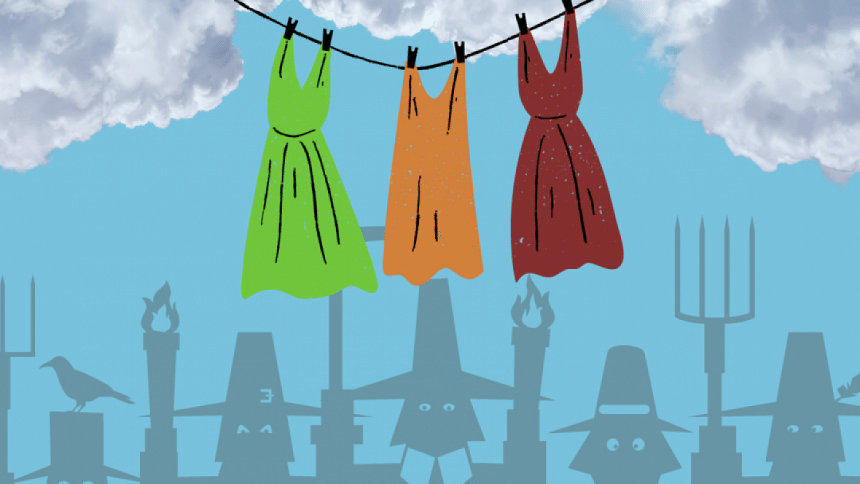Moral policing of women: From the streets to social media

In Bangladesh, moral policing of women is a commonplace occurrence. Even on social media, whether in Facebook comments or through direct messages on Instagram, armies of individuals conduct moral policing on women's clothing.
In their 2011 book Why Loiter?: Women And Risk On Mumbai Streets, Shilpa Phadke, Sameera Khan, and Shilpa Ranade analyse the politics of how male dominance in public spaces has led to the exclusion of women through establishing ideas of lack of safety and security. In basic terms, the book challenges the widely held belief that women are not allowed to loiter for pleasure or linger out in public settings without a purpose or companions. "When society wants to keep a woman secure, it never chooses to make public spaces safe for her," according to the authors, instead attempting to limit her right to this space.
And, of course, if a woman is attacked in public, the focus quickly shifts to why she was there, what she was wearing, and who she was with, putting the entire burden of proof on her. On the one hand, it puts further social and peer pressure on the harassed women, while on the other, it deflects attention away from the harassers. When women are subjected to moral policing in public spaces, such responses are also frequently seen in Bangladesh. The authors argue that "the struggle against violence and the pursuit for pleasure cannot be two separate things" when defending loitering as a feminist practice.
While the fight against violence is based on exclusion, dividing people into "aggressors" and "victims," the pursuit of pleasure is framed in more inclusive terms and thus non-divisive – this right to loiter is not just for women, but for all marginalised groups, implying an "undifferentiated right to public space." Although the aforementioned book is set in Mumbai, the concerns and background the authors' highlight are very relevant to Dhaka and all of Bangladesh. And, it is relevant in the context of why moral policing is prevalent for women in public places.
Bangladesh's female labour force participation rate is 35 percent, according to data from the International Labour Organization (ILO) (as of June 2022). Although Bangladesh's female labour force participation percentage has continuously risen, there has been an intriguing decline in recent years. The percentage of women who were employed was 27 per cent in 1990. It increased gradually, reaching its most significant percentage of 36 percent in 2017, and continued to rise until 2019. It decreased to 35 per cent starting in 2020 and stayed there in 2021.
This decline can be explained in several ways, including people's lifestyles drastically changing as a result of the Covid pandemic, and many people (including women) losing their jobs; or how Covid's repercussions increased gender-based violence against women at home, which had the inevitable effect of making it difficult for women to continue working. This poses a serious problem for the country. Also, public transport is not yet secure enough for women, which works as a hindrance for working women. According to a UNDP (Bangladesh), NHRC and CRI survey, 36 percent women in Bangladesh regularly face harassment on public transport. Does the increasing aggression towards women reflect that the State's overall patriarchal power is also on rise?
One crucial factor is that the moral policing of women in public spaces, nowadays, is not only done by the men, but also by women. This makes the situation intricately more complex. It refers to the segregation of society in relation to social and political contexts. Does intolerance result from a theological perspective or covert social norms that persist in patriarchal societies? The internalisation of patriarchy has been passing from one generation to another for centuries. But, what has caused the recent rise of moral policing of women both by men and women? Can it be the outcome of a segregated society which is creating toxicity as a by-product?
Often, religious leaders openly preach about how to control or punish women, especially in villages and small towns. These sermons have encouraged individuals to adopt a mindset that belittles the contributions of women in our society.
Earlier, those sermons were limited to religious events only. But these days, those sermons are available in abundance in audio formats, as YouTube videos, and on other social media sites. The misogynistic sermons have instilled a general animosity towards women. Nobody considers or discusses this unregulated area, and there are not many ways of keeping an eye on this anti-women mindset.
Gender awareness is a fundamental requirement to address the existing unfavourable conditions for women. Gender issues on curricula should be included in the primary level to the tertiary level texts. The way things are now turning out for women in public spaces makes urgent policy changes from the government essential. This will apply to both formal and informal learners in the population.
Many individuals with misogynistic mindsets can be found working, loitering, and occupying public spaces on the streets. How can they be educated about gender-based learning? The government, non-government organisations, and civil societies are required to conduct social and media campaigns to raise awareness about the moral policing of women in public places. It serves as a gentle reminder to us all that, given that women make up more than half of Bangladesh's population, "regulating" their activities will have a negative impact on how much they contribute to the economy.
Asmaul Husna is a poet and feminist. She works with the Bangladesh Institute of Development Studies (BIDS).

 For all latest news, follow The Daily Star's Google News channel.
For all latest news, follow The Daily Star's Google News channel. 



Comments